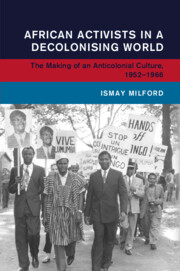Book contents
- African Activists in a Decolonising World
- Global and International History
- African Activists in a Decolonising World
- Copyright page
- Contents
- Figures
- Maps
- Acknowledgements
- Abbreviations
- Introduction
- 1 Regional Learning
- 2 Information Sources
- 3 Before Accra
- 4 Publicity and Violence in the Shadow of Algeria
- 5 Conspiracy in the Congo
- 6 Radio Waves
- Conclusion
- Bibliography
- Index
5 - Conspiracy in the Congo
Youth, Students and the Cold War Challenge
Published online by Cambridge University Press: 02 March 2023
- African Activists in a Decolonising World
- Global and International History
- African Activists in a Decolonising World
- Copyright page
- Contents
- Figures
- Maps
- Acknowledgements
- Abbreviations
- Introduction
- 1 Regional Learning
- 2 Information Sources
- 3 Before Accra
- 4 Publicity and Violence in the Shadow of Algeria
- 5 Conspiracy in the Congo
- 6 Radio Waves
- Conclusion
- Bibliography
- Index
Summary
In September 1961, Munu Sipalo circulated a conspiracy pamphlet at the founding conference of the Non-Aligned Movement in Belgrade. Chapter 5 thinks through the motif of conspiracy to ask how this cohort responded to the challenges of the global Cold War, particularly in the context of the Congo Crisis of 1960–1961. Congo had a particular resonance for this regional cohort, laying bare the high stakes of ‘nominal’ political independence in a time of Cold War neo-colonialism. In London, the Committee of African Organisations commented on the unfolding crisis and its implications for decolonising knowledge production, as Chango Machyo and Dennis Phombeah launched pamphlet ventures in the aftermath of an All-African Students Conference. For many in this cohort, engagement with the contours of the Cold War happened through youth and student internationals. Samuel Kajunjumele attended the 1959 Vienna World Youth Festival with the International Union of Socialist Youth at a pivotal moment: just as these organisations increased their contacts in the region, the uncertainty of independence negotiations made students abroad appear a liability – in notable contrast to the early 1950s.
Keywords
- Type
- Chapter
- Information
- African Activists in a Decolonising WorldThe Making of an Anticolonial Culture, 1952–1966, pp. 172 - 207Publisher: Cambridge University PressPrint publication year: 2023

